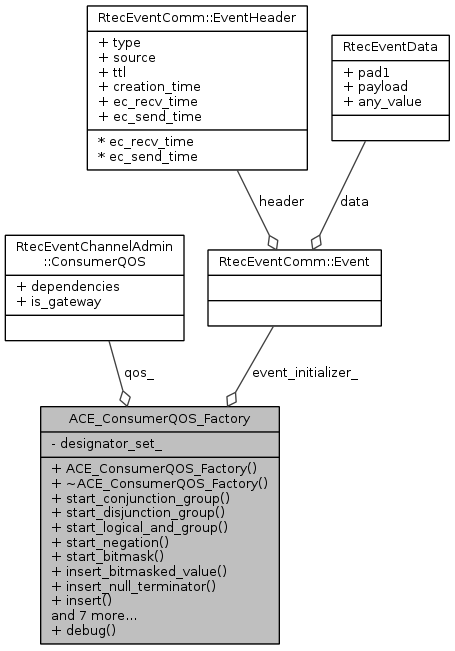|
| | ACE_ConsumerQOS_Factory (TAO_EC_Event_Initializer initializer=0, CORBA::ULong qos_max_len=0) |
| | Default construction.
|
| |
| | ~ACE_ConsumerQOS_Factory (void) |
| | Death and destruction.
|
| |
| int | start_conjunction_group (int nchildren=0) |
| |
| int | start_disjunction_group (int nchildren=0) |
| |
| int | start_logical_and_group (int nchildren=0) |
| |
| int | start_negation (void) |
| |
| int | start_bitmask (CORBA::ULong source_mask, CORBA::ULong type_mask) |
| |
| int | insert_bitmasked_value (CORBA::ULong source_mask, CORBA::ULong type_mask, CORBA::ULong source_value, CORBA::ULong type_value) |
| |
| int | insert_null_terminator (void) |
| | Insert a node that accepts any event, useful for bitmask filters.
|
| |
| int | insert (const RtecEventChannelAdmin::Dependency &subscribe) |
| |
| int | insert (RtecEventComm::EventSourceID source, RtecEventComm::EventType type, RtecBase::handle_t rt_info) |
| |
| int | insert_type (RtecEventComm::EventType type, RtecBase::handle_t rt_info) |
| | Insert type-only dependency.
|
| |
| int | insert_source (RtecEventComm::EventSourceID source, RtecBase::handle_t rt_info) |
| | Insert source-only dependency.
|
| |
| int | insert_time (RtecEventComm::EventType type, RtecEventComm::Time interval, RtecBase::handle_t rt_info) |
| |
| int | insert_act (RtecEventComm::EventData act) |
| | This will be inserted as type ACE_ES_EVENT_ACT.
|
| |
const
RtecEventChannelAdmin::ConsumerQOS & | get_ConsumerQOS (void) |
| |
| | operator const RtecEventChannelAdmin::ConsumerQOS & (void) |
| | Calls this->get_ConsumerQOS.
|
| |
Consumer QOS Factory.
This class allows easy (free from CORBA IDL constraints) construction of RtecEventChannelAdmin::ConsumerQOS structures. = CORRELATIONS ACE_ConsumerQOS_Factory separates subscriptions into conjunction and disjunction groups. A group can be thought of as a set of events inside parenthesis: (A+B+C), where A,B, and C are events. The following code would be used to represent (A+B) | (B+C): ACE_ConsumerQOS_Factor factory; factory.start_conjunction_group (); factory.insert (A); factory.insert (B); factory.start_conjunction_group (); factory.insert (B); factory.insert (C); The following code would be used to represent (A|B) | (B|C): ACE_ConsumerQOS_Factor factory; factory.start_disjunction_group (); factory.insert (A); factory.insert (B); factory.start_disjunction_group (); factory.insert (B); factory.insert (C); First, this may not seem to be initially useful, as (A|B) | (B|C) seems the same as A|B|C. However, this form does have a significant use when deadline timers are specified (described below). Note that groups end with the next call to start_XX_group. Groups are always OR'd together. That is, there is no way to directly build (A|B|C) + (D|E|F). You can always expand the previous statement to the OR of multiple ANDs. = TIMEOUTS There are two types of timeout types defined in Event_Service_Constants.h. ACE_ES_EVENT_INTERVAL_TIMEOUT - the consumer wants to receive a timeout every N seconds. ACE_ES_EVENT_DEADLINE_TIMEOUT - the consumer wants the timeout if and only if some dependencies are not resolved first. Using these timeouts with the correlations discussed above, we can construct four different timer semantics: Interval Timer, Deadline Timer, Interval Correlation, Deadline Correlation: Interval Timer: (A+B+C) | (D+E+F) | (G+H+I) | IntervalTimeout This registers to receive an interval timeout regardless of other dependencies. Event if events occur, the interval timeout will still be sent. Deadline Timer: (A+B+C) | (D+E+F) | (G+H+I) | DeadlineTimeout This registers to receive the deadline timeout ONLY if no other events occur. If a single event is sent to the consumer, the timer is cancelled and rescheduled. Deadline Correlation: (A+B+C) | (D+E+F) | (G+H+DeadlineTimeout) If G and H do not occur within DeadlineTimeout time, a deadline timeout is sent. It is cancelled and rescheduled if G and H occur. Interval Correlation: (A+B+C) | (D+E+F) | (G+H+IntervalTimeout) G+H+IntervalTimeout are sent ONLY after all have occurred. If G+H occur, they are queued until IntervalTimeout occurs. If IntervalTimeout occurs, it is queued until G+H occur.

 1.8.2
1.8.2